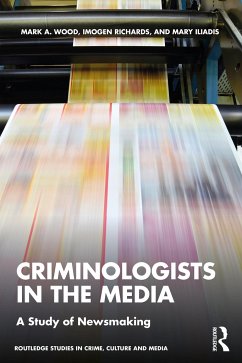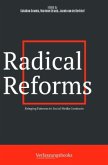Criminologists in the Media presents the results of a cross-national study examining the structures that shape criminologists' contributions to news and social media discourse.
Drawing on interviews with criminologists and a survey of 1,211 criminologists working in the US, the UK, Australia, New Zealand, Canada, Ireland, and South Africa, this book represents the first cross-national study exploring how, why, and to what extent criminologists working in these countries engage in newsmaking and digital public criminology. Through examining the predictors of criminologists appearing in news media, the research presented in this book demonstrates that newsmaking practices within criminology are not reflective of equal access, interest, or opportunity. Rather, newsmaking operates within 'fields of power' shaped by the political economy of higher education, and researchers' academic rank, gender, and areas of research expertise. Together, these factors generate several 'situational logics' that predispose criminologists to pursue particular courses of action in promoting their personal projects. Key among these logics, Wood, Richards, and Iliadis argue, are a 'social logic' informing criminologists' moral-political views on newsmaking and an 'industrial logic' responsive to the demands of academic capitalism and the rise of the 'entrepreneurial' university.
With its focus on the practicalities, challenges, and inequities of newsmaking in the post-broadcast era, Criminologists in the Media will appeal to researchers interested in the public role(s) of criminology, as well as researchers concerned with the challenges of communicating social scientific knowledge beyond the academy.
Drawing on interviews with criminologists and a survey of 1,211 criminologists working in the US, the UK, Australia, New Zealand, Canada, Ireland, and South Africa, this book represents the first cross-national study exploring how, why, and to what extent criminologists working in these countries engage in newsmaking and digital public criminology. Through examining the predictors of criminologists appearing in news media, the research presented in this book demonstrates that newsmaking practices within criminology are not reflective of equal access, interest, or opportunity. Rather, newsmaking operates within 'fields of power' shaped by the political economy of higher education, and researchers' academic rank, gender, and areas of research expertise. Together, these factors generate several 'situational logics' that predispose criminologists to pursue particular courses of action in promoting their personal projects. Key among these logics, Wood, Richards, and Iliadis argue, are a 'social logic' informing criminologists' moral-political views on newsmaking and an 'industrial logic' responsive to the demands of academic capitalism and the rise of the 'entrepreneurial' university.
With its focus on the practicalities, challenges, and inequities of newsmaking in the post-broadcast era, Criminologists in the Media will appeal to researchers interested in the public role(s) of criminology, as well as researchers concerned with the challenges of communicating social scientific knowledge beyond the academy.
"A serious advancement in public criminology. Criminologists in the Media sheds much needed light on why certain kinds of criminologists appear more regularly in the media by identifying and unpacking key factors that considerably influence media engagement including the use of social media among criminologists and criminal justice scholars. This timely book will be of general interest to readers seeking to learn about media engagement and especially of interest to criminology scholars and students who want to know more about the dynamics that underpin the publicization of research in the media."
- Christopher J. Schneider, Brandon University
"Why do Criminologists engage with news and social media? And what are the dilemmas of such engagements? In Criminologists in the Media the authors expertly dissect these concerns, situating them within the broader social, political and economic imperatives of contemporary academia in a digital age. The result is a compelling and informed analysis of public criminology through the lens of 'newsmaking' and the impact of research within, and for, broader publics. Criminologists in the Media is a critical resource for established and emerging scholars alike, as they reflect on their own public engagements and the impacts of these for academia more widely."
-Anastasia Powell, RMIT University
"Criminologists in the Media is an eye-opening text about the conditions that shape expert commentaries about crime and criminal justice in the media. Relatable and insightful in prose, the book maps wider social changes affecting how criminologists engage with media. The authors skilfully bring together theory and empirical research to advance debates about public criminology specifically and public social science generally. It is a must read for anyone interested in understanding how shifts in academia and the media influence what knowledge becomes publicly accessible."
-Kate Henne, The Australian National University
- Christopher J. Schneider, Brandon University
"Why do Criminologists engage with news and social media? And what are the dilemmas of such engagements? In Criminologists in the Media the authors expertly dissect these concerns, situating them within the broader social, political and economic imperatives of contemporary academia in a digital age. The result is a compelling and informed analysis of public criminology through the lens of 'newsmaking' and the impact of research within, and for, broader publics. Criminologists in the Media is a critical resource for established and emerging scholars alike, as they reflect on their own public engagements and the impacts of these for academia more widely."
-Anastasia Powell, RMIT University
"Criminologists in the Media is an eye-opening text about the conditions that shape expert commentaries about crime and criminal justice in the media. Relatable and insightful in prose, the book maps wider social changes affecting how criminologists engage with media. The authors skilfully bring together theory and empirical research to advance debates about public criminology specifically and public social science generally. It is a must read for anyone interested in understanding how shifts in academia and the media influence what knowledge becomes publicly accessible."
-Kate Henne, The Australian National University








